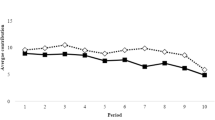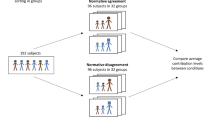Abstract
A popular approach to explain over-contribution in public good games is based on the assumption that people care (either positively or negatively) about the utility of other participants. Over-contribution then is an outcome of utility maximization where utility depends on subjects’ own payoffs as well as on the payoffs of other players. In this paper, I study to what extent this assumption of utility interdependence is responsible for over-contribution. I design three treatments where subjects’ decisions cannot affect opponents’ payoffs and thus utility interdependence cannot explain cooperative behavior. The main result is that while average contribution in these treatments is below the benchmark it nonetheless stays well above zero. Even when no one benefits from subjects’ generosity the average contributions are as high as one third of the endowment and are only 25% below those in the benchmark level. This suggests that utility interdependence is not the main factor responsible for over-contribution.
Similar content being viewed by others
References
Andreoni J, Croson R (2008) Partners versus strangers: the effect of random rematching in public goods experiments. In: Smith V, Plott C (eds) Handbook of experimental economics results (to appear)
Andreoni J (1995a) Warm-glow versus cold-prickle: the effects of positive and negative framing on cooperation in experiments. Quart J Econ 110(1): 1–21
Andreoni J (1995b) Cooperation in public goods experiments: kindness or confusion?. Am Econ Rev 85(4): 891–904
Andreoni J (1990) Impure altruism and donations to public goods: a theory of warm-glow giving. Econ J 103: 570–585
Blount S (1995) When social outcomes aren’t fair: the effect of causal attributions on preference. Organ Behav Hum Decis Process 63: 131–144
Bolton GE (1991) A comparative model of bargaining: theory and evidence. Am Econ Rev 81: 1096–1136
Bolton GE, Ockenfels A (2000) ERC: a theory of equity, reciprocity, and competition. Am Econ Rev 90: 166–193
Camerer C, Ho TH (1999) Experience-weighted attraction learning in normal form games. Econometrica 67(4): 827–874
Charness G, Rabin M (2002) Understanding social preferences with simple tests. Quart J Econ 117(3): 817–869
Erev I, Roth A (1998) Predicting how people play games: reinforcement learning in experimental games with unique, mixed strategy equilibria. Am Econ Rev 99(4): 848–881
Fehr E, Schmidt K (1999) A theory of fairness, competition and cooperation. Quart J Econ 114: 817–68
Ferraro P, Vossler C (2006) Stylized facts and identification in public good experiments: the confusion confound. Working Paper
Fischbacher Urs, Gächter S, Fehr E (2001) Are people conditionally cooperative? Evidence from a public goods experiment. Econ Lett 71: 397–404
Fischbacher Urs (2007) z-Tree Zurich toolbox for readymade economic experiments. Exp Econ 10(2): 171–178
Goeree J, Holt C (2001) Ten little treasures of game theory and ten intuitive contradictions. Am Econ Rev 91(5): 1402–1422
Holt C, Laury S (2008) Theoretical explanations of treatment effects in voluntary contributions experiments. In: Plott C, Smith V (eds) Handbook of experimental economic results. Elsevier Press, New York (forthcoming)
Houser D, Kurzban R (2002) Revisiting kindness and confusion in public goods experiment. Am Econ Rev 92(4): 1062–1069
Johnson E, Camerer C, Sen S, Rymon T (2002) Detecting failures of backward induction: monitoring information search in sequential bargaining experiments. J Econ Theory 104: 16–47
Ledyard J (1995) Public goods: a survey of experimental research. In: Kagel J, Roth A (eds) Handbook of experimental economics. Princeton University Press, Princeton, pp 111–252
Levitt S, List J (2007) What do laboratory experiments measuring social prefernces reveal about the real world?. J Econ Perspect 21(2): 153–174
Palfrey TP, Prisbrey JE (1997) Anomalous behavior in public goods experiments: how much and why?. Am Econ Rev 87: 829–846
Palfrey TR, Prisbrey JE (1996) Altruism, reputation and noise in linear public goods experiments. J Publ Econ 61: 409–427
Rabin M (1993) Incorporating fairness into game theory and economics. Am Econ Rev 83: 1281–1302
Selten R (1967) Die Strategiemethode zur Erforschung des eingeschränkt rationalen Verhaltens im Rahmen eines Oligopolexperimentes. In: Sauermann H (ed) Beiträge zur experimentellen Wirtschaftsforschung, J.C.B. Mohr (Paul Siebeck), Tübingen, pp 136–168
Author information
Authors and Affiliations
Corresponding author
Additional information
I would like to thank my dissertation advisor Shyam Sunder for his valuable suggestions that helped improve this paper. I am also grateful to Dan Levin, Ben Polak, Klaus Schmidt, Andrew Schotter, Anat Bracha, Danielle Catambay, Rodney Chan, two anonymous referees and the anonymous Associate Editor for their comments and suggestions. Participants of the 17th International Conference on Game Theory at Stony Brook University, 2006 ESA International Meeting and 10th Biennial Behavioral Decision Research in Management Conference provided a valuable feedback at earlier stages of the paper. Finally, I would like to thank the Whitebox Fellowship for its generous support of this study.
Rights and permissions
About this article
Cite this article
Shapiro, D.A. The role of utility interdependence in public good experiments. Int J Game Theory 38, 81–106 (2009). https://doi.org/10.1007/s00182-008-0141-6
Accepted:
Published:
Issue Date:
DOI: https://doi.org/10.1007/s00182-008-0141-6




